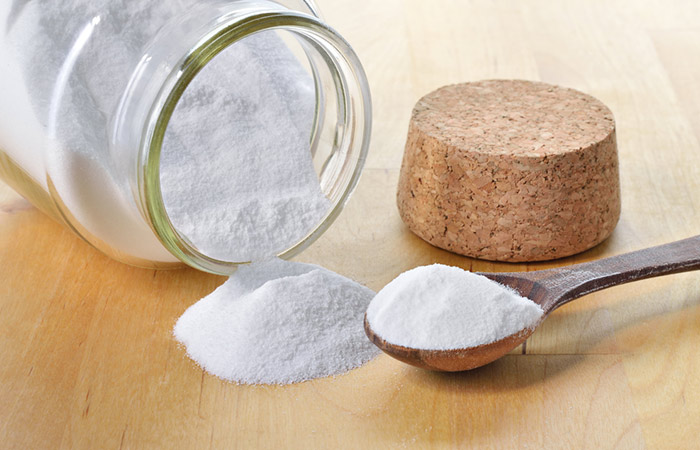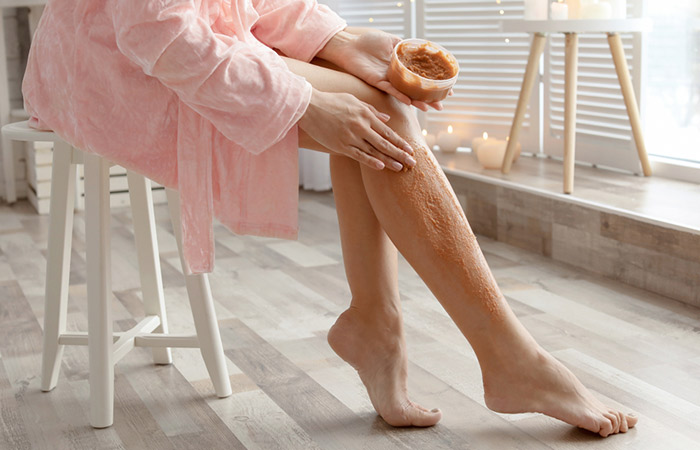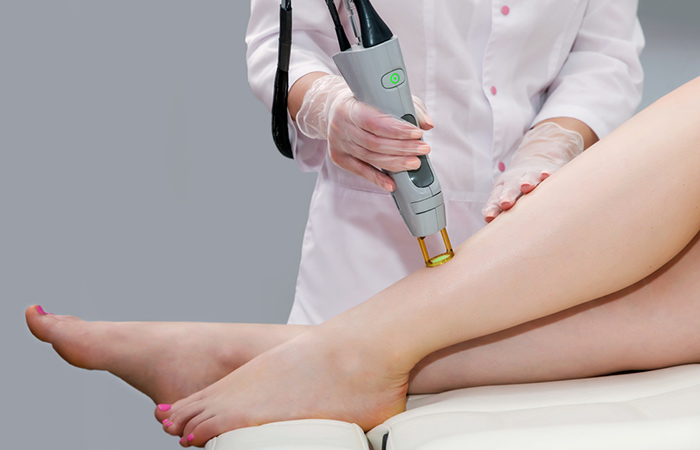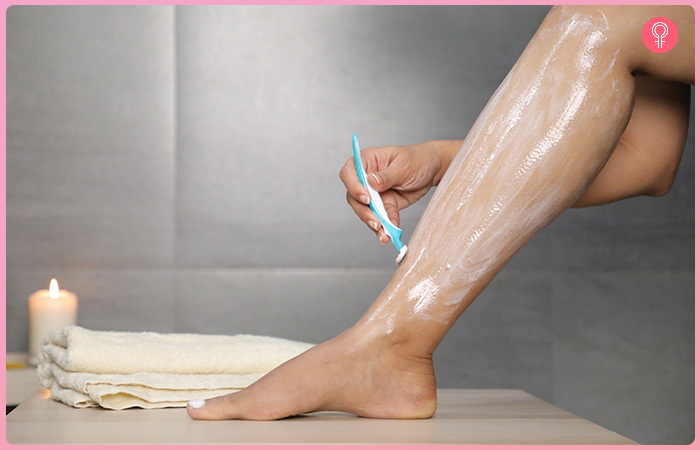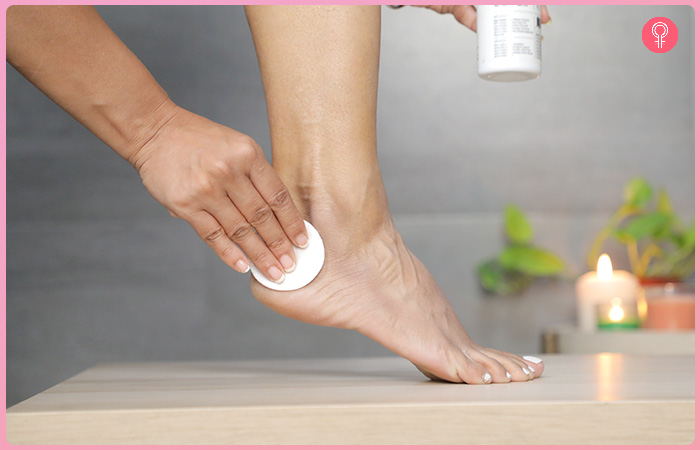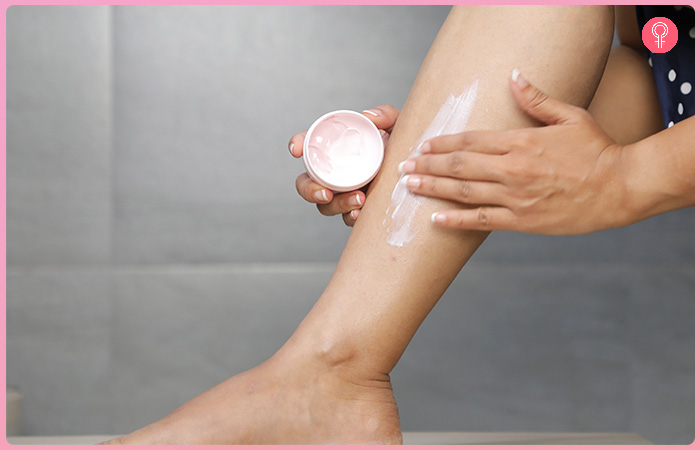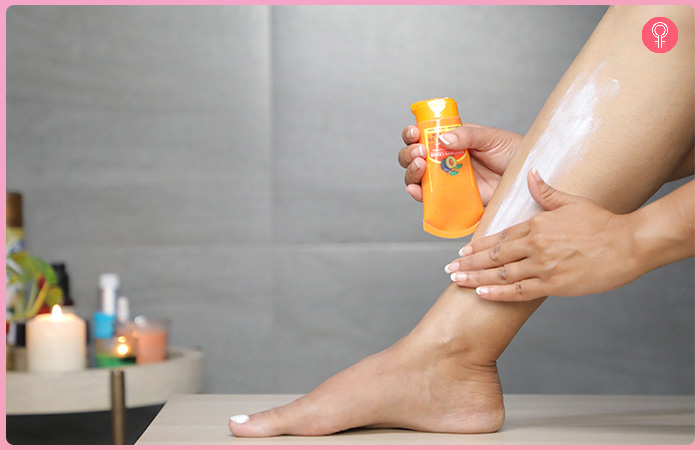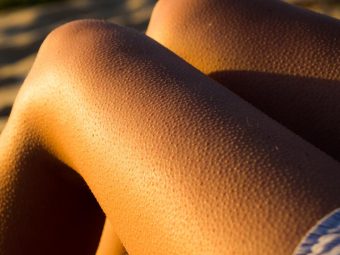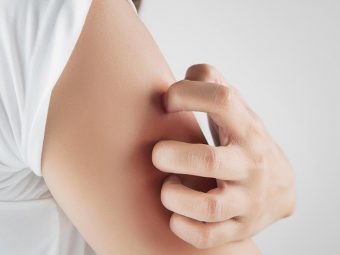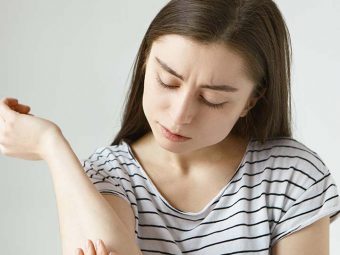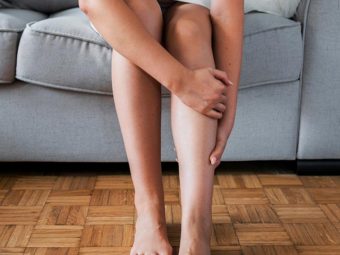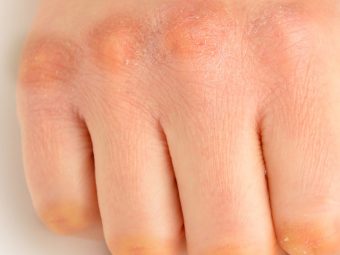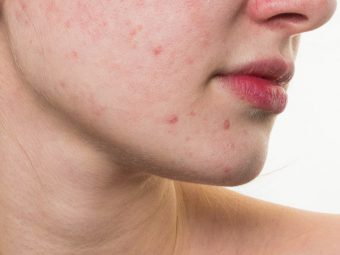Dark Spots On The Legs: Causes, DIY Home Remedies, & Treatment
Understanding the root cause of those spots is key to choosing the right treatment for you.

Image: Shutterstock
If you are concerned about the dark spots on the legs, we have the solution for you. You can get dark spots or hyperpigmentation on any body part. However, that should not stop you from flaunting your shortest shorts during the summers. It is because you can easily get rid of the spots with the right treatment and proper skin care.
Scroll through this article to understand why you develop dark spots on your legs, how you can prevent them, and treatment options.
In This Article
What Causes Dark Spots On The Legs?
You can develop hyperpigmentation or dark spots on your legs for various reasons:
1. Excessive Sun Exposure
Dark spots typically occur due to excessive sun exposure and UV damage. The UV rays trigger your skin to produce melanin to protect itself from them. However, some areas may produce excess melanin, making them appear darker than the surrounding skin. Prolonged sun exposure can also lead to sunspots and skin cancer, especially in fair skinned people.
A national text message-based survey was conducted on 977 participants to study the sun protection knowledge, experience, and behaviors of the US youth. Only 62.1% of the participants stated sun protection as very important, 25.5% as important, and 5.4% as somewhat important.
2. Shaving Improperly
Improper shaving techniques can cause tiny black spots on the legs, also known as strawberry skin. This is different from hyperpigmentation and occurs in a pattern that closely matches the skin pores and hair follicles.
This harmless skin condition is caused when you use old and dull razors, pulling methods of hair removal like hot wax, leading to ingrown hair, clogged pores, rough dark patches, tiny bumps and pigmentation.
3. Melanoma
Black and brown spots on your legs can also be a dangerous skin disease called melanoma, a type of skin cancer (1). These spots generally develop in the lower legs and tend to change color and size. Melanoma on the skin is caused by excessive exposure to UV rays and using sunbeds for fake tanning. If you notice any changes in the dark spots on your legs, get them examined by a healthcare professional as early as possible.
As per the statistics provided by the Centers for Disease Control and Prevention, the prevalence of melanoma increases as you age. The increasing age is the most important risk factor among the US population. Check out the graph below to know the rate of melanoma among the US population by age.
Rate of melanomas of the skin by age group
Source: United States Cancer Statistics: Data Visualizations4. Clogged Pores
Just like your face, the pores on your legs can get clogged with bacteria, dead skin, and sebum. Acne-prone skin, in particular, tends to produce more oil and shed cells rapidly. As a result, you will notice small black spots on your legs.
5. Folliculitis
Folliculitis is the inflammation of hair follicles caused by Staphylococcus aureus bacteria or other non-infectious factors like improper shaving, waxing, and wearing tight clothes (2). This leads to red and itchy acne-like bumps across your legs that gradually turn dark.
Mild folliculitis may go away on its own. However, if left untreated, the infection can cause permanent dark spots or scarring and other skin issues in the long run.
6. Keratosis Pilaris
Keratosis pilaris or ‘chicken skin’ is a skin condition characterized by tiny red or brown bumps on your skin (3). They most commonly appear on the outer sides of both arms but may present on the thighs and buttocks as well. They are caused by excessive keratin production, which blocks the hair follicles, leading to bumps.
Although there is no cure for it yet, skin care practices like exfoliation and moisturizing can reduce the bumpy texture of your skin and improve the appearance of your legs.
7. Diabetic Dermopathy
Diabetic dermopathy is a condition in which you develop dark spots on the lower legs. These marks are also known as shin spots and are common in patients with diabetes over the age of 50. There are no definite causes of this condition. However, the spots are thought to be caused by the excessive dryness of the skin and damaged blood vessels close to the skin layer. They tend to fade once the sugar levels are under control.
Different underlying conditions and external factors can lead to skin discoloration or pigmentation on the legs. If your dark spots are caused by an underlying condition, treating it may fade them. However, if they are due to external factors and improper skin care, you can try the following treatment options to get rid of them.
Consuming certain food items may affect your skin and lead to pigmentation issues. Learn more in the following section.
What Food Causes Dark Spots On Skin?
- Dairy Products: Milk and derived products like cheese and yogurt may cause or worsen acne breakouts (4). These flare-ups can leave behind pigmented spots.
- Sugars And Carbs: Food items with high sugar and carbohydrate content have a high glycemic index and may exacerbate acne and lead to acne spots (5).
- Fried Foods: Indulging in fried foods regularly could result in moderate to severe acne (6). Severe acne breakouts often cause spots and scarring.
- Alcohol: Alcohol can dehydrate your skin, making it appear dull. Further, its abuse is associated with inflammatory skin disorders and hyperpigmentation (7).
- Caffeine: Excessive caffeine can increase cortisol levels, leading to stress and related skin problems that may lead to pigmentation (8).
Let us now learn of some methods to treat dark spots on the legs.
How To Treat Dark Spots On The Legs: DIY Remedies And Professional Treatment
If you are into DIY skin care or want to go the natural route to eliminate dark spots on your legs, you can try these recipes.
DIY Home Remedies
1. Baking Soda
Baking soda is abrasive and may help exfoliate the skin and remove dead skin cells. This can improve the appearance of black spots on your legs.
You Will Need
- 1 tablespoon of baking soda
- 1 tablespoon of water
Method
- Mix the baking soda and water to make a paste.
- Massage the affected areas with the paste for 1-2 minutes.
- Leave it on for another 2 minutes.
- Rinse off with water.
- Apply this baking soda paste every day until you see effective results.
Ro, a Youtube vlogger, spoke about how a mixture of baking soda and citrus castile soap, followed by cocoa butter and shea butter helped fade the dark spots on her legs. She said, “It has helped to improve my skin (i).”
2. Sugar And Aloe Vera Scrub
Sugar granules work as a natural scrub that can help unclog your pores and eliminate dead skin cells. On the other hand, aloe vera moisturizes the skin and can lower skin inflammation (9).
You Will Need
- 2-3 tablespoons of sugar
- 2 tablespoons of aloe vera gel
- 1-2 tablespoons of olive oil
Method
- Mix all the ingredients in a bowl.
- Massage the scrub onto your legs in gentle circular motions.
- Rinse with cold water after 10 minutes.
- Use the scrub 2-3 times a week.
 Quick Tip
Quick Tip3. Cucumber And Rose Water Scrub
Cucumber extract has skin-lightening properties and can decrease skin melanin content (10). It also hydrates and soothes irritated skin (11). Rosewater can help maintain overall skin health (12).
You Will Need
- 1 cup of grated cucumber
- 4 tablespoons of rose water
- 2-3 drops of olive or coconut oil
Method
- Mix the ingredients to make a paste.
- Apply it to the dark spots and massage for 10 minutes.
- Rinse the paste off with water.
- Apply a moisturizer afterward.
- Use the scrub once every day.
Home remedies may take time to show results. If you want visible and faster results, you may consult a dermatologist and go for in-office treatments. Some of them are mentioned below.
Professional Treatments
1. Laser Therapy
Laser treatments are useful in correcting pigmentation marks on your legs and for reducing melasmai XBlack or gray-brown spots that appear on parts of the body due to frequent exposure to the sun or hormonal changes. (13). The dermatologist may use lasers of specific wavelength, depending on the spots and your skin type. Some of the common lasers used for treating hyperpigmentation and melasmai XBlack or gray-brown spots that appear on parts of the body due to frequent exposure to the sun or hormonal changes. include:
- Green Light: Flashlamp-pumped pulsed dye laser (PDL) (510 nm), frequency doubled QS Nd:YAG (Q Switched Neodymium: Yttrium Aluminium Garnet-532 nm)
- Red Light: QS Ruby (694 nm), QS Alexandrite (755 nm)
- Near-Infrared: QS Nd:YAG (1064 nm)
2. Cryotherapy
In this treatment, the spots are exposed to low temperatures (using liquid nitrogen solution) to destroy the dark skin cells. The spots may lighten as your skin begins to heal.
While these treatment options can be effective, it is better to take care of your skin to prevent dark spots on your legs in the first place. Read on for some preventive measures for spots and marks on your legs.
 Trivia
TriviaHow To Prevent Dark Spots On The Legs
1. Shave Properly
Lubricating the skin and using a sharp and new razor is crucial to prevent razor bumps and dark spots. Use a shaving foam and shave against the direction of hair growth. Exfoliate before shaving and moisturize the skin after shaving.
2. Exfoliation
Use exfoliants and physical scrubs to unclog the pores and prevent ingrown hairs. Regular exfoliation can also speed up skin cell regeneration, improve skin texture, and keep the legs soft, smooth and clear. However, do not over-exfoliate as it may irritate your skin even more and worsen the hyperpigmentation on your legs.
3. Moisturize Frequently
Moisturizers keep your skin soft and offer some relief from dryness and inflammation after shaving and exfoliation. Use lotions rich in plant oils and shea butter and always apply them on damp skin to guarantee optimal hydration by trapping the moisture in your skin for longer.
4. Wear Sunscreen When Stepping Out
Use a broad-spectrum sunscreen on your legs and other exposed areas. Make sure to reapply your sunscreen every 40-80 minutes for maximum protection. Use a sunscreen with a minimum SPF 30 and PA ++++ rating to prevent UVA and UVB damage.
We have addressed a few queries regarding skin discoloration in the legs and ankles in the next sections. Take a look.
Why Does My Ankle Look Darker Than My Legs?
The ankles look darker in people with dark skin tones as compared to light skin tones due to multiple reasons. Generally, it is the natural tendency of the skin on the ankles, elbows, knees, and knuckles of the fingers to develop dark color or become tanned in people with dark skin tones.
Dark spots and marks around the ankles may occur due to hemosiderin staining or chronic venous insufficiency (14). This occurs when blood leaks from the capillaries and pools under the skin, leaving a hemoglobin residue that accumulates in the tissues. Over time, the spot may appear darker than the surrounding skin and turn black.
If you notice reddish-brown spots on your ankles, along with swelling or aches, consult your physician immediately.
Why Are My Knees Discolored?
Hyperpigmentation on the knees results from friction, which triggers melanin production in the area. It may also be caused by excessive UV rays exposure and clogged skin pores around the knees.
Regular exfoliation and a broad-spectrum sunblock can help eliminate discoloration in the knees. In some cases, your dermatologist may prescribe hydroquinonei XA skin-lightening agent that bleaches the skin by decreasing the number of melanocytes (cells that contain the pigment melanin). creams to reduce the darkening.
Infographic: DIY Remedies To Get Rid Of Dark Spots On Legs
You can get rid of black spots on the legs in different ways. Some methods involve expensive cosmetic treatments while other cheaper remedies may give similar results with natural ingredients.
Check out the infographic below for a brief overview of the natural remedies that can help eliminate those dark spots and blemishes without pinching a hole in your pocket. Illustration: StyleCraze Design Team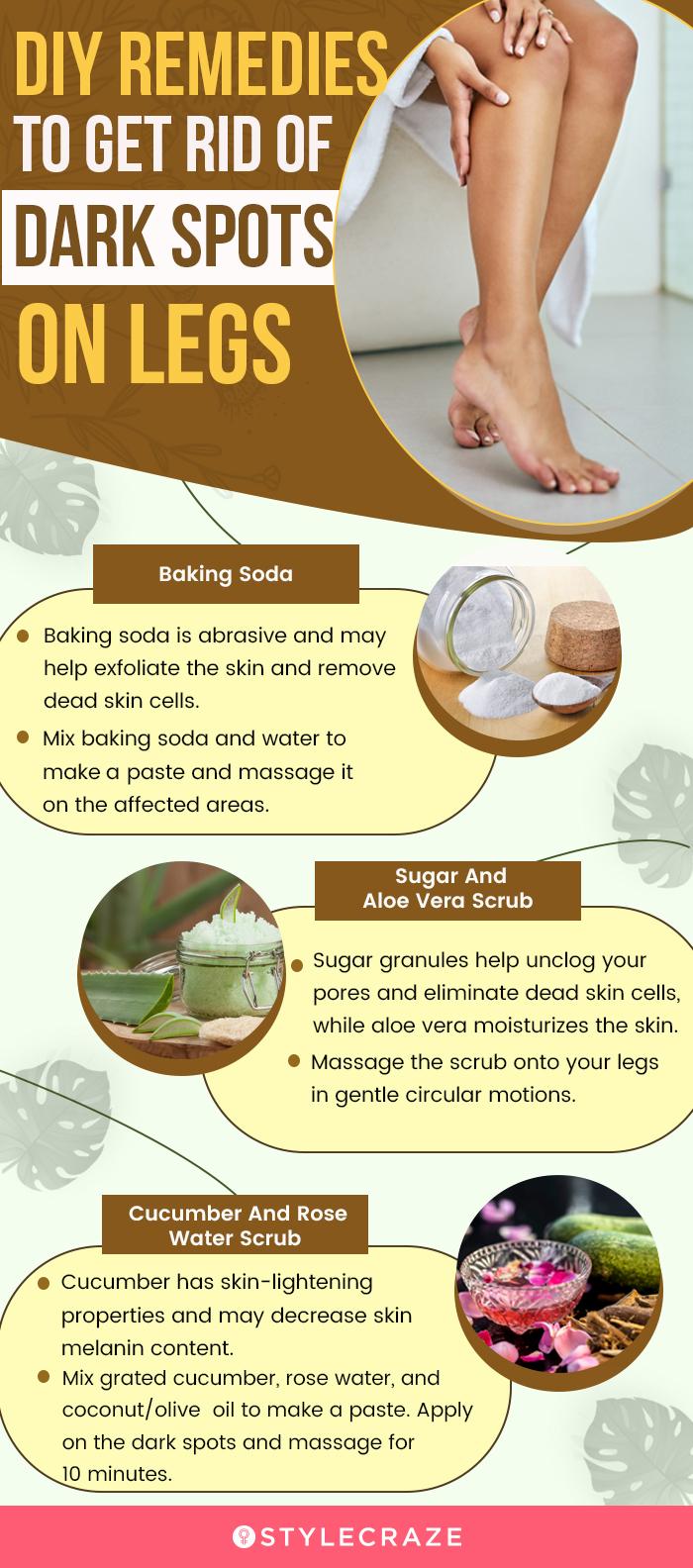
Save the high-quality PDF version on your device now.
Download Infographic
Dark spots on the legs can be prevented with good skin care and sun protection. Regularly exfoliating and moisturizing your legs can help prevent environmental damage and maintain them smoother and softer. Try the above-mentioned easy home remedies for silky smooth skin! Dark spots on the legs are hardly serious. But, if the spots bleed, change color, grow in size, or if you have discomfort or tenderness, seek medical assistance right away. The doctors can help you with proper diagnosis and the most effective dermatology treatment.
Frequently Asked Questions
What do age spots look like on legs?
Age spots appear as flat, oval, dark brown spots on the legs.
Does apple cider vinegar remove dark spots on legs?
Apple cider contains acetic, malic, and lactic acids, which may reduce the appearance of dark spots on the legs (14), (15).
Can turmeric remove dark spots on legs?
Yes, turmeric may improve the appearance of areas with hyperpigmentation (16).
Does lemon remove dark spots on legs?
Lemon contains vitamin C, a powerful antioxidant that inhibits melanin formation. This may decrease hyperpigmentation on the legs (17).
Can olive oil remove dark spots on legs?
No, there is currently no scientific evidence to indicate olive oil can remove black spots on the legs.
Can coconut oil remove dark spots on legs?
No, there is not enough evidence to suggest that coconut oil can remove dark spots.
Key Takeaways
- Dark spots on the legs appear due to excessive sun exposure, incorrect shaving practices, clogged pores, and underlying medical conditions.
- Home remedies containing baking soda, sugar, aloe vera, cucumber, and rose water, may help improve or treat this issue.
- You can also try professional beauty treatments, such as bleaching agents recommended by dermatologists, laser therapy, and chemical peeling.
- Shaving properly, exfoliating and moisturizing your skin, and applying sunscreen can prevent this issue.
Discover how to get rid of dark spots on your legs and body with apple cider vinegar! Check out this video to know more about this easy home remedy that will help you achieve clear skin.
Personal Experience: Source
i. *UPDATED* HOW TO GET RID OF DARK SPOTS ON LEGS & BODY FAST | GET CLEAR EVEN SKIN TONE
https://www.youtube.com/watch?v=VKQDXY2XYsU
Sources
Articles on StyleCraze are backed by verified information from peer-reviewed and academic research papers, reputed organizations, research institutions, and medical associations to ensure accuracy and relevance. Read our editorial policy to learn more.
- Malignant Melanoma: A Pictorial Review
https://www.ncbi.nlm.nih.gov/pmc/articles/PMC4113154/ - Special types of folliculitis which should be differentiated from acne
https://www.ncbi.nlm.nih.gov/pmc/articles/PMC5821164/ - Keratosis Pilaris
https://www.ncbi.nlm.nih.gov/books/NBK546708/ - Dairy Intake and Acne Vulgaris: A Systematic Review and Meta-Analysis of 78 529 Children
Adolescents and Young Adults - Diet and acne: A systematic review
https://www.ncbi.nlm.nih.gov/pmc/articles/PMC8971946/ - Association Between Diet and Acne Severity: A Cross-sectional Study in Thai Adolescents and Adults
https://www.ncbi.nlm.nih.gov/pmc/articles/PMC9472088/ - The effects of alcohol and drug abuse on the skin
https://pubmed.ncbi.nlm.nih.gov/20620755/ - Cortisol responses to mental stress exercise and meals following caffeine intake in men and women
https://pubmed.ncbi.nlm.nih.gov/16631247/ - ALOE VERA: A SHORT REVIEW
https://www.ncbi.nlm.nih.gov/pmc/articles/PMC2763764/ - Exploring cucumber extract for skin rejuvenation
https://www.researchgate.net/publication/260228305_Exploring_cucumber_extract_for_skin_rejuvenation - Evaluating the potential benefits of cucumbers for improved health and skin care
https://www.researchgate.net/publication/309401006_Evaluating_the_potential_benefits_of_cucumbers_for_improved_health_and_skin_care - Pharmacological Effects of Rosa Damascena
https://www.ncbi.nlm.nih.gov/pmc/articles/PMC3586833/ - Laser Toning in Melasma
https://www.ncbi.nlm.nih.gov/pmc/articles/PMC6676813/ - [Use of organic acids in acne and skin discolorations therapy]
https://pubmed.ncbi.nlm.nih.gov/25811473/ - Nutrients and bioactive components from vinegar: A fermented and functional food
https://www.sciencedirect.com/science/article/pii/S175646461930605X - Are Natural Ingredients Effective in the Management of Hyperpigmentation? A Systematic Review
https://www.ncbi.nlm.nih.gov/pmc/articles/PMC5843359/ - Cosmeceuticals for Hyperpigmentation: What is Available?
https://www.ncbi.nlm.nih.gov/pmc/articles/PMC3663177/





